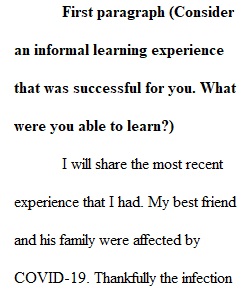


Q This week we focused on learning, how we are constantly learning new things, how it is beneficial to have a growth mindset approach to learning, and how it is helpful to reflect on our strategies as a learner. As you reflect on these strategies, think about how you previously learned a new skill, subject, or process in an informal setting. When we often think of learning, we focus on formal settings--your high school classroom, an online class you took, military training, or a bootcamp for a certification exam. Informal learning experiences can teach us quite a bit, though. What strategies and approaches did you use in your informal learning experience? How can you apply those to learning new concepts and skills while you’re a student at University of Maryland Global Campus? Even if the university environment is new to you, you come to learning with skills, strengths, and strategies you can draw from to connect new knowledge to what you already know. For example, think about how you learned to cook a new dish by following a recipe. Perhaps you first blocked out time to read the recipe all the way through, noting the ingredients and tools you would need to make the dish. When it came time to make the dish, you might have followed the recipe step by step, then asked your partner or a friend to taste it and share his or her opinion. Based on that feedback, you adjusted and customized the recipe. After that, you practiced making the dish several times, adding your own flavors and spices to perfect the recipe to your liking. Once you became familiar with the recipe, you may have progressed to making the dish from memory. As a university student, you can apply this same learning process and strategy to your academics. Let’s look at the correlation between the two. When you’re learning a new concept or skill in one of your courses, first, set aside time in your schedule to learn. Next, read about the topic and take notes to deepen your understanding. Practice what you learned, maybe by using flashcards or completing a set of exercises. Next, share what you learned with others, such as your instructor or classmates, to get their feedback on your work and to enhance your learning from their input. Finally, practice a few more times until you can readily transfer what you learned to different contexts. For this assignment, take some time to reflect on the following questions: Consider a learning experience that was successful for you. What were you able to learn? What did you do that helped you succeed in your learning? How would you apply those strategies to your classwork at University of Maryland Global Campus?
View Related Questions